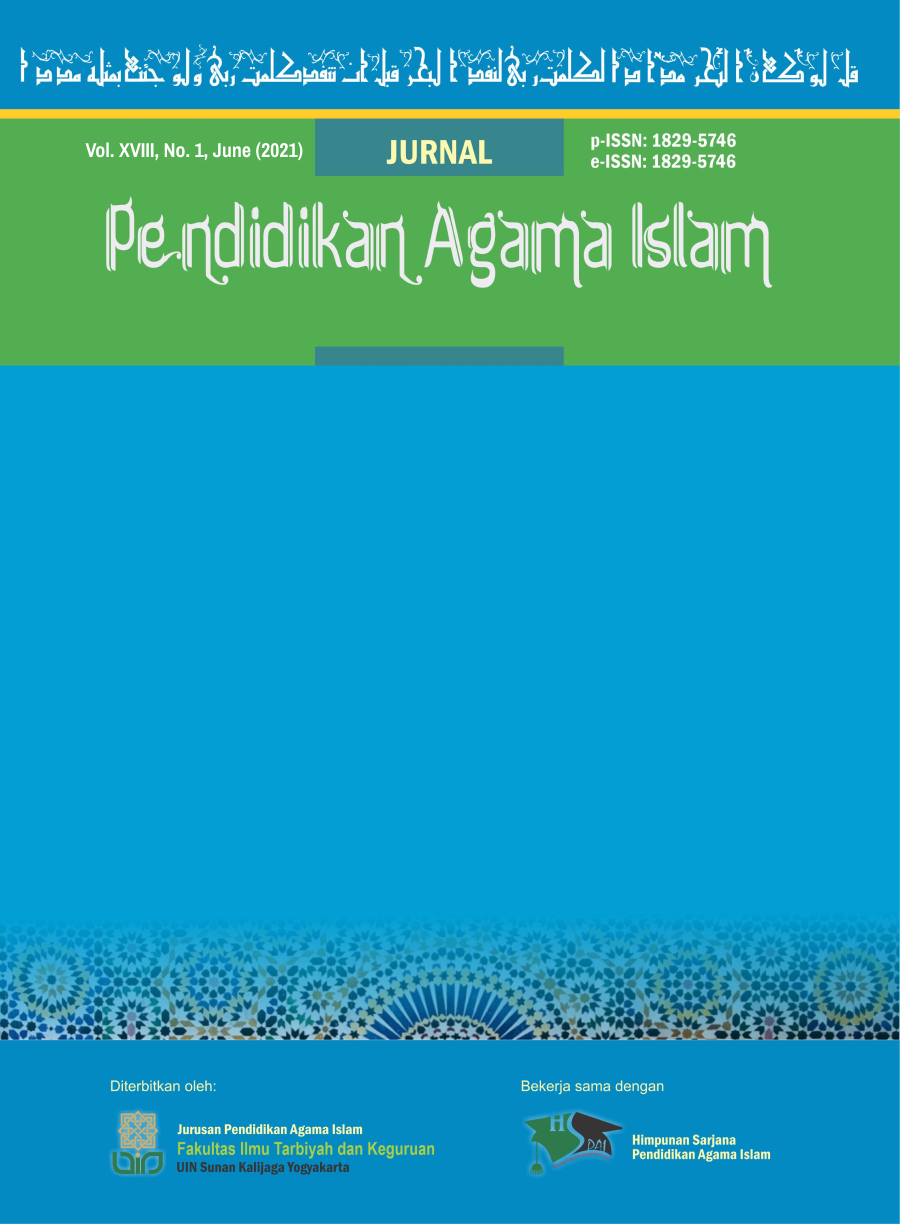Learning the Yellow Book in Al-Fitroh Jejeran Boarding School, Wonokromo Pleret Bantul: Study of Learning Materials in Philosophical Perspective
##plugins.themes.bootstrap3.article.main##
Abstract
Many studies on boarding school have been carried out before by researchers. But most of these studies are more descriptive by describing what happened in the boarding. While studies about boarding school analyzed with philosophical theory are still rarely conducted. The subjects of this study were caregivers and some students who were selected purposively. The data collection uses observation, interview and documentation. This paper aims to reveal the philosophical perspective of the learning materials of the Yellow Book in al-Fitroh Jejeran Boarding school, Wonokromo Pleret Bantul. The philosophical framework used as a reference for the analysis of this study is the Religious-Conservative tradition (al-Diniy al-muhafidz). Religious -Rational (al-Dini al-' Aqliy) and Pragmatic-Instrumental (al-Darai'i) traditions. The results showed that philosophically learning the Yellow Book in that boarding school uses religious-conservative tradition (al-Diniy al-muhafidz). The source of the material taught refers to the yellow books produced by scholars in the Middle Ages. The reason Kyai refers in the classical books because the books were written by salafiyyin scholars closer to its existence with the Prophet, to allow the truth is more assured. According to his beliefs getting closer to the existence of the prophet, the value of truth is more authentic. While the Religious-Rational School (al-Dini al-'Aqliy) has not got an adequate place in the Boarding School. The existence of general science is not given to students so that the students are not affected by outside influences that will slowly erode and keep students away from religious sciences. While the instrumental pragmatic tradition (al-Darai'i) which is characterized by accommodating a variety of tangible sciences related to the direct needs of humans, both spiritual needs and material needs, must be recognized not all can be organized by the boarding school completely.
Keywords:
Downloads
##plugins.themes.bootstrap3.article.details##
Copyright

This work is licensed under a Creative Commons Attribution-ShareAlike 4.0 International License.
Copyright Notice
Authors who publish with this journal agree to the following terms:
- Authors retain copyright and grant the journal right of first publication with the work simultaneously licensed under a Creative Commons Attribution License that allows others to share the work with an acknowledgement of the work's authorship and initial publication in this journal.
- Authors are able to enter into separate, additional contractual arrangements for the non-exclusive distribution of the journal's published version of the work (e.g., post it to an institutional repository or publish it in a book), with an acknowledgement of its initial publication in this journal.
- Authors are permitted and encouraged to post their work online (e.g., in institutional repositories or on their website) prior to and during the submission process, as it can lead to productive exchanges, as well as earlier and greater citation of published work.
References
Abd. Rachman Assegaf, Aliran Pemikiran Pendidikan Islam Hadharah Keilmuan Tokoh Klasik Sampai Modern, (Jakarta: RajaGrafindo Persada, 2013). hal.57.
Abdul Muhit An Nawai, Amantu billah, (Yogyakarta: Pondok Pesantren Al-Fitroh Jejeran, 1996).
______, Adzkar Al-Shalah, (Yogyakarta: Pondok Pesantren Al-Fitroh, tt).
______, Amantu Billah, (Yogyakarta: Pondok Pesantren Al-Fitroh Jejeran, tt)
______, Infaq al-Sa’ah (Yogyakarta: Pondok Pesantren Al-Fitroh, tt)
______, Nidaul Mukminin ila Dzikrillah (Yogyakarta: Pondok Pesantren Al-Fitroh Jejeran, tt).
______, Safinatus Sunan fi shalawatil al-masnunat. (Yogyakarta: Pondok Pesantren Al-Fitroh, tt).
Ahmad Marzuqi, Nadham ‘Aqidah “Awam) (Tk: Menara Kudus, tt).
Hafidh ibn Hajar al-‘Asqalani, Bulugh al-Maram, (Haramain: Thab’ah Jadidah Munqa’ah, tt).
JM Muslimin, “Tradisi Ilmiah dalam Masyarakat Islam: sejarah, Institusi dan Tantangan Perubahan” dalam Kusmana dan JM Muslimin (ed.), Paradigma Baru Pendidikan Restrospeksi dan Proyeksi Modernisasi Pendidikan Islam di Indonesia, ((Jakarta: DirektoratPendidikan Tinggi Direktorat Jendral Pendidikan Islam Departemen Agama RI, 2008).
Karel A. Steenbrink, Pesantren Madrasah Sekolah Pendidikan Islam dalam Kurun Moderen, (Jakarta: LP3ES, 1986).
Mahmud Arif, Pendidikan Islam Transformatif, (Yogyakarta: LKiS, 2008)
Muhammad Mamsyad ibnu Abdul Muhit, Bidayah al-Hidayah, (Yogyakarta: Pondok Pesantren Al-Fitroh, tt).
Muhammad Nawawi al-Syafi’I al-Qadiri, Bahjul Wasail bi Syarhi masail , (Semarang: tp, tt).
Muhammad Syakir, Washaya al-Aba lil Abna, (Surabaya: Maktabah Hidayah, tt).
Nur Munajat, “Perkembangan, Karakteristik dan Aliran Pendidikan Pesantren di Indonesia” Makalah diidskusikan di Kelas Program Doktor Konsentrasi Kependidikan Islam pada tangal 10 Mei 2013.
Ramayulis, Sejarah Pendidikan Islam Napaktilas Perubahan Konsep, Filsafat dan Metodologi Pendidikan Islam dari Era Nabi SAW sampai Ulama Nusantara, (Jakarta: Kalam Mulia, 2011).
Riska Wahyu Nurcendani, “The Integration of 2013 curriculumwith Pesantren curriculum in Fiqh Subject of Class X at Madrasah Aliyah al-Mawaddah Ponorogo” Jurnal Pendidikan Agama Islam Vol. 17 No. 2 Desember 2020.
Sembodo Ardi Widodo, Pendidikan Islam di Indonesia Dasar Pemikiran dan Implementasi, (Yogyakarta: Pustaka Felicha, 2009.
Syeh Said ibnu Sa’ad ibnu Nabhan al-Hadlramy, ‘Iddatul Faridl fi Ilm Al-Faraidl, (Surabaya: Maktabah Muhammad Ibnu Ahmad Nabhan wa Auladih, tt).
Umar Abdul Jabbar, Khulashah Nurul Yakin Fi Sairah Sayyid al-Mursalin, (Surabaya: Pustaka Salim Nabhan, tt).
Umar bin Ahmad Barja’, Akhlaq Lil Banin, (Surabaya: Maktabah Muhammad Ibnu Ahmad, tt).
Zainal Abidin, “Educational Management of Pesantren in Digital Era 4.0” Jurnal Pendidikan Agama Islam Vol. 17 No. 2 Desember 2020
445
Views
389
Downloads





